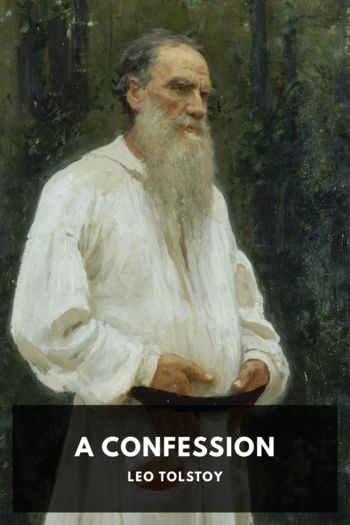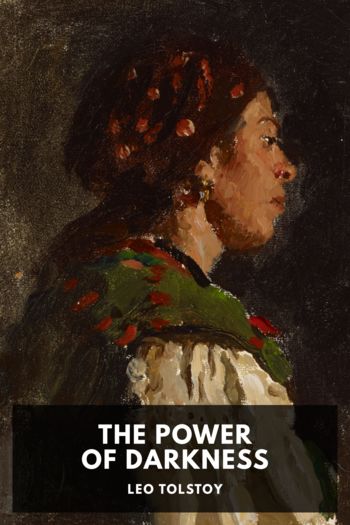Resurrection by Leo Tolstoy (best sci fi novels of all time TXT) 📕

- Author: Leo Tolstoy
Book online «Resurrection by Leo Tolstoy (best sci fi novels of all time TXT) 📕». Author Leo Tolstoy
“Yes, I know you always do things the wrong way round, and according to your own ideas.”
“My own ideas? I have faith like the most simple peasant woman,” said Mariette with a smile. “And, thirdly, I am going to the French Theatre tomorrow night.”
“Ah! And have you seen that—What’s her name?” asked Countess Katerína Ivánovna. Mariette gave the name of a celebrated French actress.
“You must go, most decidedly; she is wonderful.”
“Whom am I to see first, ma tante—the actress or the preacher?” Nekhlúdoff said with a smile.
“Please don’t catch at my words.”
“I should think the preacher first and then the actress, or else the desire for the sermon might vanish altogether,” said Nekhlúdoff.
“No; better begin with the French Theatre, and do penance afterwards.”
“Now, then, you are not to hold me up for ridicule. The preacher is the preacher and the theatre is the theatre. One need not weep in order to be saved. One must have faith, and then one is sure to be gay.”
“You, ma tante, preach better than any preacher.”
“Do you know what?” said Mariette. “Come into my box tomorrow.”
“I am afraid I shall not be able to.”
The footman interrupted the conversation by announcing a visitor. It was the secretary of a philanthropic society of which the Countess was president.
“Oh, that is the dullest of men. I think I shall receive him out there, and return to you later on. Mariette, give him his tea,” said the Countess, and left the room, with her quick, wriggling walk.
Mariette took the glove off her firm, rather flat hand, the fourth finger of which was covered with rings.
“Want any?” she said, taking hold of the silver teapot, under which a spirit lamp was burning, and extending her little finger curiously. Her face looked sad and serious.
“It is always terribly painful to me to notice that people whose opinion I value confound me with the position I am placed in.” She seemed ready to cry as she said these last words. And though these words had no meaning, or at any rate a very indefinite meaning, they seemed to be of exceptional depth, meaning, or goodness to Nekhlúdoff, so much was he attracted by the look of the bright eyes which accompanied the words of this young, beautiful, and well-dressed woman.
Nekhlúdoff looked at her in silence, and could not take his eyes from her face.
“You think I do not understand you and all that goes on in you. Why, everybody knows what you are doing. C’est le secret de polichinelle. And I am delighted with your work, and think highly of you.”
“Really, there is nothing to be delighted with; and I have done so little as yet.”
“No matter. I understand your feelings, and I understand her. All right, all right. I will say nothing more about it,” she said, noticing displeasure on his face. “But I also understand that after seeing all the suffering and the horror in the prisons,” Mariette went on, her only desire that of attracting him, and guessing with her woman’s instinct what was dear and important to him, “you wish to help the sufferers, those who are made to suffer so terribly by other men, and their cruelty and indifference. I understand the willingness to give one’s life, and could give mine in such a cause, but we each have our own fate.”
“Are you, then, dissatisfied with your fate?”
“I?” she asked, as if struck with surprise that such a question could be put to her. “I have to be satisfied, and am satisfied. But there is a worm that wakes up—”
“And he must not be allowed to fall asleep again. It is a voice that must be obeyed,” Nekhlúdoff said, falling into the trap.
Many a time later on Nekhlúdoff remembered with shame his talk with her. He remembered her words, which were not so much lies as imitations of his own, and her face, which seemed looking at him with sympathetic attention when he told her about the terrors of the prison and of his impressions in the country.
When the Countess returned they were talking not merely like old, but like exclusive friends who alone understood one another. They were talking about the injustice of power, of the sufferings of the unfortunate, the poverty of the people, yet in reality in the midst of the sound of their talk their eyes, gazing at each other, kept asking, “Can you love me?” and answering, “I can,” and the sex-feeling, taking the most unexpected and brightest forms, drew them to each other. As she was going away she told him that she would always be willing to serve him in any way she could, and asked him to come and see her, if only for a moment, in the theatre next day, as she had a very important thing to tell him about.
“Yes, and when shall I see you again?” she added, with a sigh, carefully drawing the glove over her jewelled hand.
“Say you will come.”
Nekhlúdoff promised.
That night, when Nekhlúdoff was alone in his room, and lay down after putting out his candle, he could not sleep. He thought of Máslova, of the decision of the Senate, of his resolve to follow her in any case, of his having given up the land. The face of Mariette appeared to him as if in answer to those thoughts—her look, her sigh, her words, “When shall I see you again?” and her smile seemed vivid as if he really saw her, and he also smiled. “Shall I be doing right in going to Siberia? And have I done right in divesting myself of my wealth?” And the answers to the questions on this Petersburg night, on which the daylight streamed into the window from under the blind, were quite indefinite. All seemed mixed in his head. He recalled his former state of mind, and the former sequence of his thoughts, but they had no longer their former power or





Comments (0)